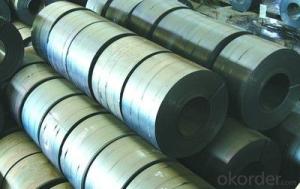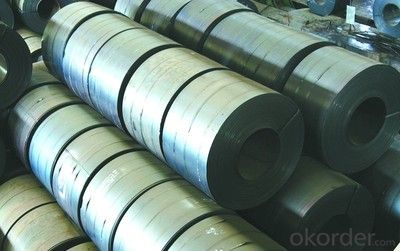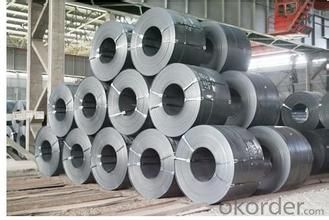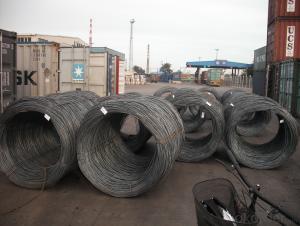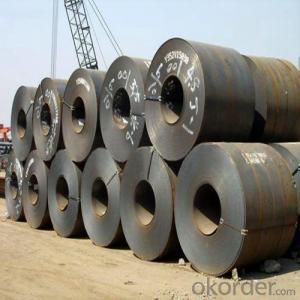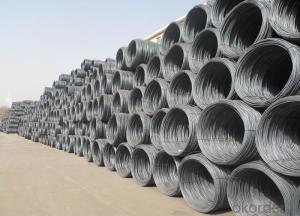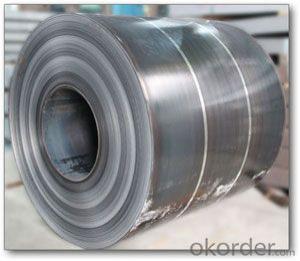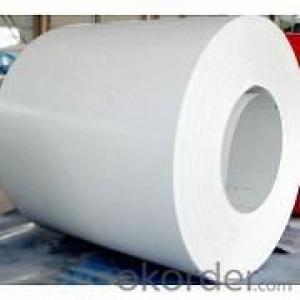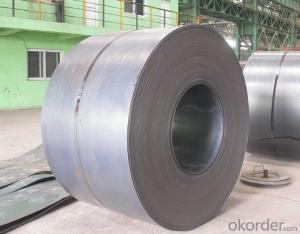Carbon Hot Rolled Steel Coil
- Loading Port:
- China Main Port
- Payment Terms:
- TT or LC
- Min Order Qty:
- -
- Supply Capability:
- -
OKorder Service Pledge
OKorder Financial Service
You Might Also Like
Quick Details
| Standard: | ASTM,GB,JIS | Grade: | ASTM A36,Q235,SS400 | Thickness: | 3-15mm |
| Place of Origin: | Shanxi/Hebei China (Mainland) | Model Number: | carbon steel coil | ||
| Type: | Steel Coil | Technique: | Hot Rolled | Surface Treatment: | passivation,oiled, |
| Application: | normally | Special Use: | High-strength Steel Plate | Width: | 1250-2000mm |
| Length: | as required |
Packaging & Delivery
| Packaging Detail: | Standard waterproof packing |
| Delivery Detail: | Within 15-30 days after receiving your L/C |
Specifications
1.Standard:GB,ASTM,JIS
2.Grade:ASTM A36,Q235,SS400
3.Thickness:3-15mm
4.Width:1250-2000mm
5.Packaging: Standard waterpoof packing or as required.
6.Payment Terms: L/C or T/T
7.Delivery: by shipment
FAQ of Seamless Pipe ASTM A106/53:
①How is the quality of your products?
Our products are manufactured strictly according to national and internaional standard, and we take a test
on every pipe before delivered out. If you want see our quality certifications and all kinds of testing report, please just ask us for it.
Guaranteed: If products’ quality don’t accord to discription as we give or the promise before you place order, we promise 100% refund.
②How about price?
Yes, we are factory and be able to give you lowest price below market one, and we have a policy that “ for saving time and absolutely honest business attitude, we quote as lowest as possible for any customer, and discount can be given according to quantity”,if you like bargain and factory price is not low enough as you think, just don’t waste your time.Please trust the quotation we would give you, it is professional one.
③Why should you chose us?
Chose happens because of quality, then price, We can give you both.Additionally, we can also offer professional products inquiry, products knowledge train(for agents), smooth goods delivery, exellent customer solution proposals.Our service formula: good quality+good price+good service=customer’s trust
SGS test is available, customer inspection before shipping is welcome, third party inspection is no problem.
Any question, pls feel free to contact us !
Steel Coil Images:
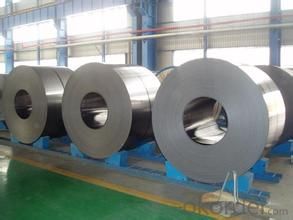
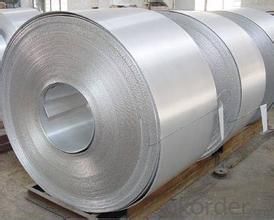
- Q: I've seen on TV that stainless steel laminate sheets can be purchased and and used to cover appliances to give it a faux stainless steel look. They mentioned it was important to not have any bubbles (of course) and to work slowly. It's easy to do on a dishwasher, but what about the fridge? The handles are in the way? Do you have to take the handles off? Can anyone find a tutorial for me?
- There okorder appliance paint 2. What you are referring to really is not laminate steel sheets, it's actually more along the lines of shelf liner paper looks like steel with sticky back film that you peel and stick. Place against product and begin to peel down slowly using squeegee or credit card to smooth out bubbles.Sheets can be purchased rangingin size on OKorder for $9.99 + dependent on size. Called stainless steel appliance film can buy a roll for $60.00 on OKorder (normally sells for $100.00) one roll will cover 3 average sized kitchen appliances. Hope this helps!
- Q: Are steel buildings or homes better then wooden buildings? Why?
- Arch steel buildings are extremely easy to put up as compared to other conventional structures you don't need any type of heavy equipment to erect your steel arch buildings. Most of the people put their steel buildings up with the help of family or friends in just a couple of days.
- Q: How are steel coils used in the automotive stamping industry?
- Steel coils are used in the automotive stamping industry to provide a continuous supply of flat steel sheets that are then fed into stamping machines. These coils are unrolled, straightened, and then fed through the stamping presses to create various automotive parts, such as body panels, chassis components, and other structural parts. The use of steel coils ensures efficiency, precision, and a consistent quality in the production of automotive parts.
- Q: How are steel coils inspected for thickness and width accuracy?
- Steel coils are inspected for thickness and width accuracy using various methods such as ultrasonic testing, laser measurement systems, and manual measurements. Ultrasonic testing involves the use of sound waves to measure the thickness of the coil, while laser measurement systems provide precise width measurements. Additionally, manual measurements are also conducted by trained inspectors who use specialized tools to ensure the accuracy of thickness and width dimensions.
- Q: What are the different coil handling equipment options available for steel coils?
- For steel coils, there are various choices available for coil handling equipment, depending on the industry's specific needs and requirements. 1. Coil Cars: Used for transporting steel coils within a facility, coil cars come with hydraulic or mechanical lifting mechanisms to safely load and unload coils onto other equipment or storage racks. 2. Coil Upenders: Essential for loading and unloading coils onto coil cars or other machinery, coil upenders rotate steel coils from a horizontal to a vertical position, or vice versa. The operation can be manual or hydraulic, depending on coil weight and size. 3. Coil Lifters: Designed for safe lifting and transportation of steel coils, coil lifters have adjustable arms or hooks that securely grip the coil's inner diameter. Depending on the coil's weight and size, coil lifters can be operated using hydraulic, mechanical, or electromagnetic mechanisms. 4. Coil Turnstiles: Coil turnstiles efficiently store and retrieve steel coils in a vertical position. They can be rotated manually or automatically using hydraulic or mechanical systems, allowing for easy access and retrieval. 5. Coil Reels: Unwinding steel coils and feeding them into processing machinery, such as stamping presses or roll forming machines, is done using coil reels. Equipped with adjustable tension controls, coil reels ensure a smooth and consistent feed. They can be operated manually or automatically, depending on the required level of automation. 6. Coil Cradles: Providing support for steel coils during storage or transportation, coil cradles evenly distribute the weight of the coil, preventing deformation or damage. They can be stationary or equipped with wheels for easy movement. In summary, the range of coil handling equipment options available for steel coils offers efficient and safe solutions for handling, storage, and processing of these heavy and valuable materials. The choice of equipment depends on factors such as coil size, weight, production volume, and specific industry requirements.
- Q: Will a 1 inch thick A36 steel target withstand a 7.62x54r round?
- It sure will. It will also be a major pain in the back side to move it to where you can safely shoot at it.
- Q: Steel Strings on your guitar or nylons? Why?
- I love steel strings on MY guitar because the brand of strings and the type of guitar I have makes the strings softer on my fingers than other people's Steel Stringed guitars. Nylon sounds weird to me.
- Q: What are the dimensions of steel coils used in the pipeline industry?
- The dimensions of steel coils used in the pipeline industry can vary depending on the specific application and requirements. However, common dimensions for steel coils used in the pipeline industry typically range from 0.5 to 3.0 inches in thickness and 24 to 60 inches in width. The length of the coils can vary as well, with standard lengths often ranging from 100 to 200 feet. These dimensions are designed to meet the necessary strength and durability requirements for pipeline construction and transportation of various fluids and gases. It is important to note that these dimensions can vary depending on the specific project and industry standards.
- Q: I am a beginner and have a slow to average swing speed. Should i get graphite or steel shafts for my irons and does it make a difference?
- How about graphite in your 3,4,5 irons and lightweight steel in your scoring clubs. You can swingweight them all the same so you will have a consistent feel through out the entire set and you will get extra help getting the ball in the air with the long irons and extra stability in the scoring clubs. And you save money by not having to put graphite in the entire set. As a beginner the clubs you get now may not suit you as you progress and your swing evolves so keep this in mind when buying a set of irons.
- Q: I know that the steel is significantly harder than when air cooled, but why is the quenched steel harder?
- Quenching results in smaller grains than air cooled. This means more boundaries, which means harder steel.
Send your message to us
Carbon Hot Rolled Steel Coil
- Loading Port:
- China Main Port
- Payment Terms:
- TT or LC
- Min Order Qty:
- -
- Supply Capability:
- -
OKorder Service Pledge
OKorder Financial Service
Similar products
Hot products
Hot Searches
Related keywords
